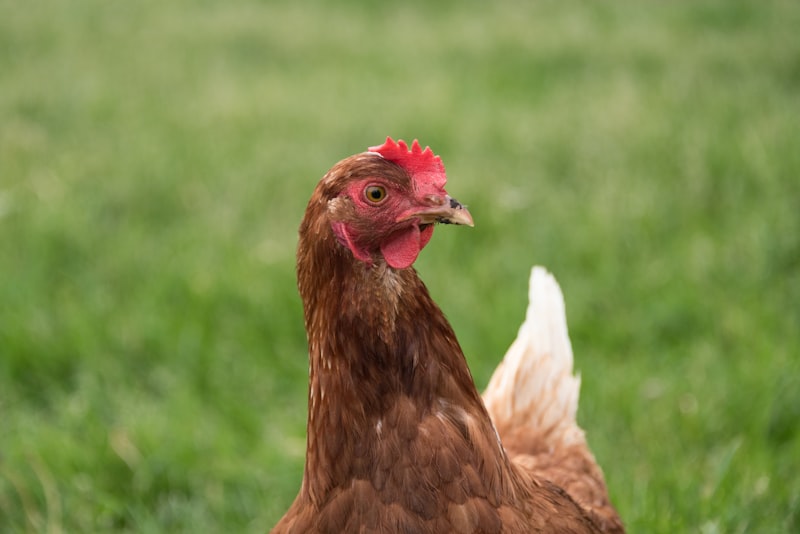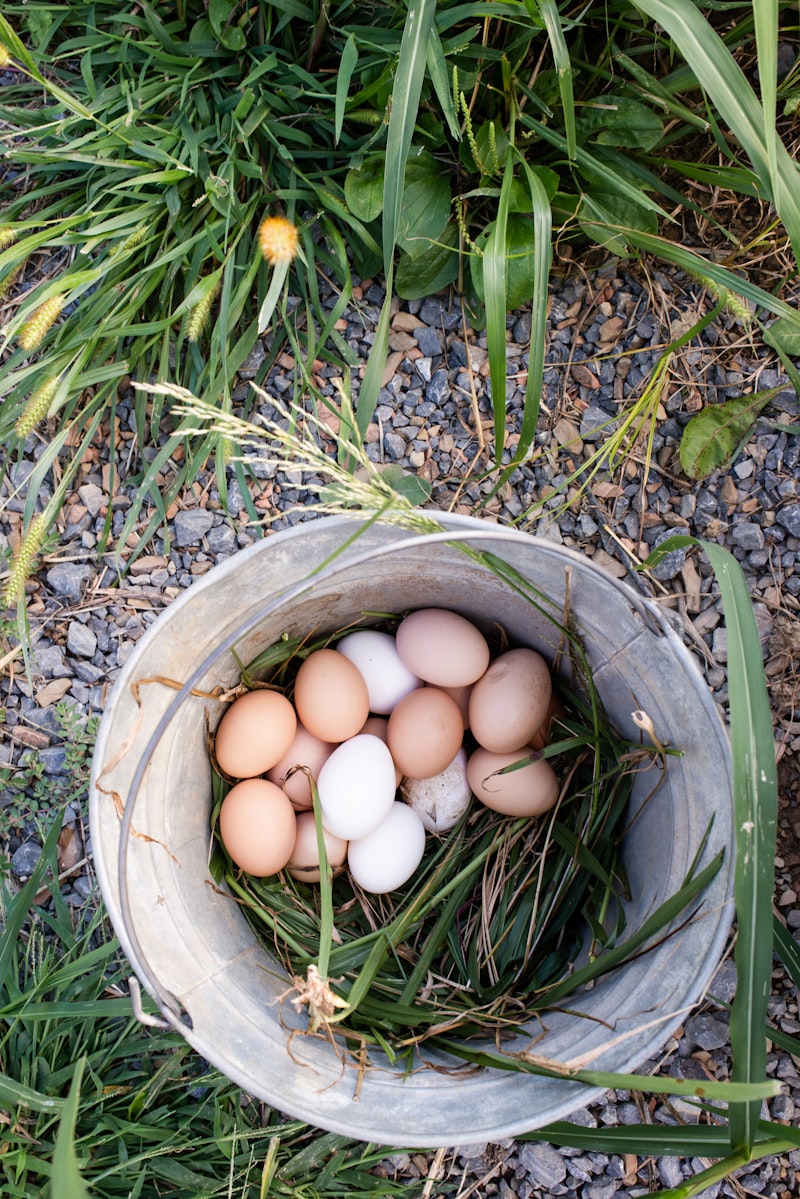Firstly, shelter is crucial. Chickens need a secure coop that protects them from predators and provides a safe place to roost at night. The coop should be well-ventilated yet draft-free, with nesting boxes filled with clean bedding where hens can comfortably lay eggs.
Next, consider the outdoor space. Chickens love to roam and scratch, so a fenced yard or chicken run is ideal. This area should be spacious enough to allow them to exercise and explore while keeping them protected. Providing some shade and areas for dust bathing will keep your chickens happy and healthy.
Now, onto nutrition. A balanced diet is key to their well-being. Commercial chicken feed is formulated to meet their nutritional needs, but you can also supplement with kitchen scraps (avoiding anything harmful like citrus or avocado), greens, and occasional treats like mealworms. Fresh water should always be available, especially during hot weather.
Healthcare is another aspect to keep in mind. Regularly check your chickens for signs of illness and ensure their living quarters are clean to prevent parasites and diseases. Some owners also choose to vaccinate their flock against common diseases for added protection.
Lastly, enjoy the benefits! Chickens not only provide fresh eggs but also companionship and entertainment with their quirky behaviors. Watching them explore their surroundings and interact with each other can be a delightful addition to your backyard.
By providing proper shelter, space, nutrition, healthcare, and enjoying their company, you’ll create a thriving environment for your backyard chickens. Whether you’re a beginner or seasoned poultry enthusiast, these tips will help you nurture happy and healthy chickens in your own backyard.
Feathered Friends: Your Essential Guide to Keeping Chickens at Home
Firstly, housing is crucial. A sturdy coop that offers protection from predators and the elements is essential. Make sure it has ample space for roosting and nesting boxes for laying eggs comfortably. Keep the coop clean and well-ventilated to prevent diseases and maintain hygiene.
Feeding your chickens a balanced diet is equally important. A mix of commercial chicken feed and kitchen scraps provides them with essential nutrients. Ensure they have access to fresh water at all times, especially during hot weather.
When it comes to breeds, consider your needs and environment. Some breeds are prolific egg layers, like Rhode Island Reds or Leghorns, while others, such as Orpingtons or Silkies, are prized for their docile nature and beautiful plumage. Choose breeds that suit your climate and space availability.
Daily interaction with your chickens helps to tame them and build trust. Regular health checks are vital to spot any signs of illness early. Dust bathing is natural behavior for chickens, so provide them with a suitable area for this activity.
Keeping chickens requires dedication and a bit of know-how, but the rewards are plenty. From fresh eggs to companionship, these feathered friends can enrich your life in more ways than one. So, whether you’re considering your first flock or expanding your current one, remember that a happy chicken is a healthy chicken!
Backyard Bounty: How to Start Raising Chickens for Fresh Eggs
Dreaming of farm-fresh eggs right from your backyard? Raising chickens can turn that dream into a reality, bringing wholesome goodness straight to your table. Imagine waking up to the gentle clucking of happy hens and gathering warm eggs still gleaming with morning dew. It’s not just about sustainability but about knowing exactly where your food comes from.
To begin your journey into chicken keeping, start with the basics. First, consider your local regulations. Some areas have restrictions on the number of chickens you can keep or specific coop requirements. Checking with your local agricultural extension office can provide you with valuable information.
Next, choose the right breed for your needs. Whether you prefer prolific layers like Leghorns or dual-purpose breeds like Rhode Island Reds, each breed offers its own advantages. Some are renowned for their egg production, while others excel in meat quality too.
Building a coop is essential for your feathered friends’ safety and comfort. A good coop provides shelter from predators and the elements, with enough space for roosting and nesting boxes. Remember, happy chickens lay better eggs!
Feeding your chickens a balanced diet is crucial for their health and egg quality. Commercial feeds formulated for layers ensure they receive the right nutrients, including calcium for strong eggshells. Supplementing with kitchen scraps and occasional treats like mealworms can add variety to their diet.
Routine care involves daily checks for eggs, refilling water and feed, and cleaning the coop regularly. This not only keeps your chickens healthy but also ensures your eggs stay fresh and delicious.
Joining local poultry groups or online forums can connect you with experienced chicken keepers who can offer advice and support. Learning from others’ experiences can smooth your journey into this rewarding hobby.
Raising chickens isn’t just about eggs; it’s about connecting with nature, sustainability, and knowing your food intimately. It’s a journey that starts with a simple coop and a handful of fluffy chicks but rewards you with wholesome, nutritious eggs and a deeper connection to your food source.
Ready to embark on your backyard chicken adventure? Get started today and enjoy the simple pleasure of farm-fresh eggs from your own flock.
This article aims to be engaging and informative, providing practical tips while maintaining a conversational tone to captivate the reader’s interest in backyard chicken keeping.
From Coop to Table: Mastering the Art of Urban Chicken Farming
Raising chickens in urban settings isn’t just about fresh eggs; it’s a journey of nurturing and connecting with nature in a concrete jungle. Picture this: your mornings start with the gentle clucking of hens as they greet the sunrise. Their coop, carefully designed to fit snugly in your backyard or rooftop terrace, becomes a mini sanctuary where each hen has her own personality and quirks.
The benefits of urban chicken farming extend beyond the joy of collecting eggs. Chickens are natural pest controllers, gobbling up insects and turning kitchen scraps into nutrient-rich compost. Their presence promotes a greener environment, reducing food waste and lowering your ecological footprint right from your doorstep.
But mastering this art requires more than just setting up a coop. It’s about understanding the needs of your feathered friends, ensuring they have ample space to roam and access to clean water and nutritious feed. Building a coop that balances comfort and safety is crucial, providing shelter from the elements and predators while allowing for adequate ventilation and natural light.
Urban chicken farming isn’t without its challenges. Zoning regulations, noise concerns, and the welfare of your chickens are all factors to consider. Yet, the rewards are bountiful. From the satisfaction of knowing where your food comes from to the joy of teaching children about sustainability, urban chicken farming enriches lives and communities.
So, whether you’re a seasoned urban farmer or just dipping your toes into homesteading, embracing the art of raising chickens in the city promises a journey filled with clucks, cackles, and a newfound appreciation for the simple pleasures of farm life in an urban oasis.
Cluck Cluck: Everything You Need to Know About Chicken Care in Your Backyard
Firstly, choosing the right breed is crucial. Some chickens are better layers, while others are more suited for meat production. Popular choices like Rhode Island Reds or Leghorns are known for their egg-laying prowess, while Buff Orpingtons are prized for their docile nature, making them great pets.
Next, housing your chickens properly ensures their safety and comfort. A sturdy coop with ample space for roosting and nesting boxes is essential. It should provide protection from predators and adverse weather conditions. Remember, happy chickens lay better eggs!
Feeding your chickens a balanced diet is key to their health. A good mix of commercial feed, supplemented with kitchen scraps and occasional treats like mealworms or greens, keeps them happy and ensures they get all the necessary nutrients.
Healthcare for your flock involves regular checks for signs of illness or parasites. Keeping their coop clean and dry helps prevent common ailments. If needed, consult with a veterinarian who specializes in poultry care for guidance on vaccinations and treatments.
Lastly, spending time with your chickens is the best part of backyard farming. They thrive on interaction and can become quite tame with regular handling. Watching them scratch, peck, and cluck around your yard is not only entertaining but also therapeutic.
Raising chickens in your backyard is a delightful journey. By providing proper care, housing, and nutrition, you can enjoy fresh eggs and the companionship of these charming birds. Whether you’re a novice or experienced, the joy of having chickens is truly something to cluck about!
Egg-cellent Homesteading: Tips and Tricks for Keeping Happy Chickens
Are you thinking about raising chickens in your backyard? Whether you’re a seasoned homesteader or just starting out, keeping chickens can be a rewarding experience. From fresh eggs to lively companionship, chickens offer a lot in return for proper care and attention. Let’s dive into some egg-cellent tips and tricks to ensure your feathered friends stay happy and healthy.
First things first, when starting your chicken journey, consider the breed that best suits your needs. Are you aiming for prolific egg layers, colorful plumage, or docile temperaments? Breeds like Rhode Island Reds and Leghorns are renowned for their egg-laying prowess, while Orpingtons and Silkies are beloved for their friendly personalities. Pick a breed that matches your preferences and climate conditions for optimal results.

A well-designed coop is essential for the comfort and safety of your chickens. Ensure your coop provides ample space for roosting and nesting boxes for laying eggs. Good ventilation is crucial to prevent moisture buildup and ensure good air quality. Remember, happy chickens make for better egg producers!
Like any animal, chickens thrive on a balanced diet. Provide a high-quality commercial feed suitable for laying hens, supplemented with kitchen scraps and occasional treats like mealworms or greens. Fresh, clean water should always be available. A nutritious diet not only supports egg production but also contributes to overall health and vitality.
Regular health checks are vital to catch any issues early. Keep an eye on your chickens’ behavior and appearance. Clean the coop regularly to prevent parasites and diseases. Dust-bathing areas help chickens maintain healthy plumage and deter pests naturally.
Collect eggs daily to ensure freshness and prevent breakage. Store eggs in a cool, dry place with proper rotation (first in, first out). Fresh eggs are a delight to cook and bake with, so enjoy the fruits of your chickens’ labor!
Raising chickens can be a fulfilling adventure, whether for fresh eggs, companionship, or a connection to sustainable living. By following these egg-cellent tips and tricks, you’ll be well on your way to keeping happy chickens and enjoying the rewards they bring to your homestead. Happy homesteading!
Feathered Neighbors: A Beginner’s Guide to Urban Chicken Keeping
Are you intrigued by the idea of having feathered friends right in your backyard? Urban chicken keeping can be a rewarding experience, bringing a touch of rural charm to city living. Whether you’re a curious beginner or someone looking to enrich their urban lifestyle, here’s a beginner’s guide to getting started with your own backyard flock.
First things first, consider your local regulations. While many cities allow chicken keeping, there might be specific rules regarding coop size, noise regulations, and the number of chickens you can have. Checking with your local authorities ensures a smooth start to your urban chicken adventure.
Next, think about housing for your chickens. A sturdy coop is essential to provide shelter from the elements and predators. It should have ample space for roosting and nesting boxes where your hens can comfortably lay eggs.
Choosing the right breed is another crucial step. Some breeds are better suited to urban environments than others, known for their docile nature and ability to adapt to smaller spaces. Popular choices include the Rhode Island Red, Plymouth Rock, and Orpington.
Feeding your chickens a balanced diet is essential for their health and egg production. A mix of commercial feed, grains, and occasional treats like vegetables or mealworms keeps them happy and healthy.
Maintenance involves daily tasks like refilling water and checking feed levels, as well as weekly cleaning of the coop to ensure a hygienic environment for your chickens.
Beyond practicalities, having chickens can be surprisingly therapeutic. Watching them scratch around, clucking contentedly, can be a calming ritual in a bustling city setting.
Embarking on urban chicken keeping is not just about fresh eggs; it’s a lifestyle choice that connects you with nature even in the heart of the city. Ready to dive into the world of feathered neighbors? Get started and discover the joys of urban chicken keeping today!
Chickens 101: The Comprehensive Handbook to Backyard Poultry
Welcome to ‘Chickens 101: The Comprehensive Handbook to Backyard Poultry’! If you’ve ever considered bringing a bit of rural charm to your backyard or are simply intrigued by the idea of fresh eggs every morning, this guide is your ticket to becoming a backyard poultry pro.
Imagine waking up to the gentle clucking of happy hens as they forage for breakfast in your own backyard. It’s a picturesque scene that many urban and suburban dwellers are embracing as they discover the joys and benefits of raising chickens at home.
Why chickens, you ask? Well, these feathered friends are not just excellent egg producers; they also make great pets with their quirky personalities and low-maintenance needs. Plus, they provide natural pest control and fertilize your garden as they roam around.
Getting started is easier than you might think. First, decide on your flock size and breed. For beginners, docile breeds like Rhode Island Reds or Orpingtons are recommended for their friendly nature and high egg yields. Next, you’ll need a coop that offers protection from predators and the elements. Think of it as their stylish urban condo!

Feeding your feathered ladies is straightforward. A balanced diet of commercial feed supplemented with kitchen scraps keeps them healthy and happy. And don’t forget fresh water daily – hydration is key to egg production.
Now, let’s talk about egg-citement! Hens typically start laying eggs around 5-6 months old, depending on the breed. Each hen has her own unique laying pattern, so expect a delightful variety of egg colors and sizes.
Maintenance is minimal but important. Spend a few minutes each day checking food and water, collecting eggs, and tidying up their coop. It’s a small investment of time for the rich rewards of fresh, organic eggs right from your backyard.
Ready to join the backyard poultry revolution? Whether you’re a seasoned farmer or a complete newbie, raising chickens enriches your life in unexpected ways. Stay tuned for more tips and tricks on how to create a clucking good home for your feathered friends!
Frequently Asked Questions
How do I keep predators away from my backyard chickens
Learn effective methods to protect your backyard chickens from predators with our concise guide. Discover practical tips to safeguard your poultry and ensure their safety.
How do I choose the right chicken breeds for my backyard
Learn how to select the best chicken breeds for your backyard with our concise guide. We cover factors like climate suitability, egg production, temperament, and space requirements to help you make an informed choice.
What are the common health issues and how do I care for sick chickens
Discover common health issues in chickens and learn essential care tips for sick birds. This FAQ covers symptoms to watch for, such as respiratory problems or unusual behavior, and provides guidance on supportive care, isolation procedures, and when to seek veterinary assistance.
What should I feed my backyard chickens
Find out the best diet for your backyard chickens to ensure their health and productivity. Learn about essential nutrients, appropriate treats, and how to balance their diet for optimal egg production and overall well-being.
What are the basic requirements for keeping chickens in my backyard
Learn about the essential requirements for keeping chickens in your backyard, including space for a coop and run, proper nutrition and clean water, protection from predators, and local regulations concerning noise and waste management.


